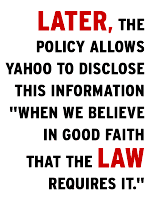| |||||||||

Policy change at Yahoo causes "identity crisis"
 Yahoo quietly changed its policy on how they turn over members' names when served with a subpoena, but users may not know it. Yahoo quietly changed its policy on how they turn over members' names when served with a subpoena, but users may not know it. The policy change follows a legal tangle stemming from Yahoo releasing a member's name under subpoena and that person subsequently being fired from his job. The fired employee sued Yahoo earlier this month, alleging the Internet portal turned his real name over to his employer, AnswerThink Consulting Group, without notifying him first. With advance notice, people can often get a court to quash a civil subpoena. Supporting the lawsuit are The Electronic Privacy Information Center and the American Civil Liberties Union. AnswerThink subpoenaed Yahoo in March for the identity of "Aquacool_2000," who had posted messages about the consulting firm's management team. One message read: "One (manager) is so dull that a 5-watt bulb gives him a run for his money." AnswerThink spokeswoman Kristin Friel said the company fired the employee and is suing him for the remarks posted on the Yahoo message board. The company's suit claims it was harmed by his "illegal dissemination of confidential information." The company did not identify the type of confidential information that was allegedly disclosed. Yahoo says they changed their subpoena policy in April-after revealing the identity of "Aquacool_2000," but before he sued them.
Previously, Yahoo immediately turned over identities without notifying the user. Under the new policy, names are no longer automatically revealed. "We now notify the user and give them 15 days to respond," Yahoo spokeswoman Shannon Stubo said. Interestingly, however, the terms and conditions posted at Yahoo have not been amended. And no existing document or memo seems to describe the change. "There's actually nothing in writing," Yahoo's Stubo said. Yahoo encourages people to join its message boards under anonymous screen names and members can be forgiven for believing that their information is in fairly safe hands. Yahoo's privacy policy states that members will be notified "if your data will be shared with a third party and you will always have the option of not permitting the transfer." Later, the policy allows Yahoo to disclose this information "when we believe in good faith that the law requires it." Aquacool_2000's lawsuit, however, claims that Yahoo had a policy of handing over members' real names without any legal requirement to do so. There's no doubt that companies are issuing lots of subpoenas seeking the identity of anonymous critics. "Yahoo! receives hundreds of civil subpoenas every year for information identifying members," according to the suit. Unlike a subpoena issued by a court, a civil subpoena issued by a private attorney has a different legal status. Any company can file a lawsuit, after which one of its attorneys can write a document called a civil subpoena. This document is a request for information. America Online and the Microsoft Network (MSN) give subscribers two weeks notice of subpoenas, during which the requests are often challenged successfully, says David Sobel, a spokesman for EPIC. This two-week grace period is the same policy that several Yahoo.com officials say they have put into effect, although it is not written down. "In fairness to Yahoo, it appears that that practice doesn't appear in writing at MSN or AOL, either," Sobel said. The right to anonymity lies at the heart of the Internet and other forms of speech. The U.S. Supreme Court most recently cemented a First Amendment right to anonymity in a 1995 case. The court wrote that anonymity "is not a pernicious fraudulent practice, but an honorable tradition of advocacy and of dissent." It is probably a good idea to ask Internet chat services whether they agree with the Supreme Court's view before trusting them with your true identity. Do you know of a problem affecting consumers? Send info to tips@BrianLivingston.com. He'll send you a book of high-tech secrets free if you're the first to submit a tip he prints. about the writer |
|
|||||||||||||||||||||||
|
Send us news tips | Contact Us | Corrections | Privacy Policy |
|

